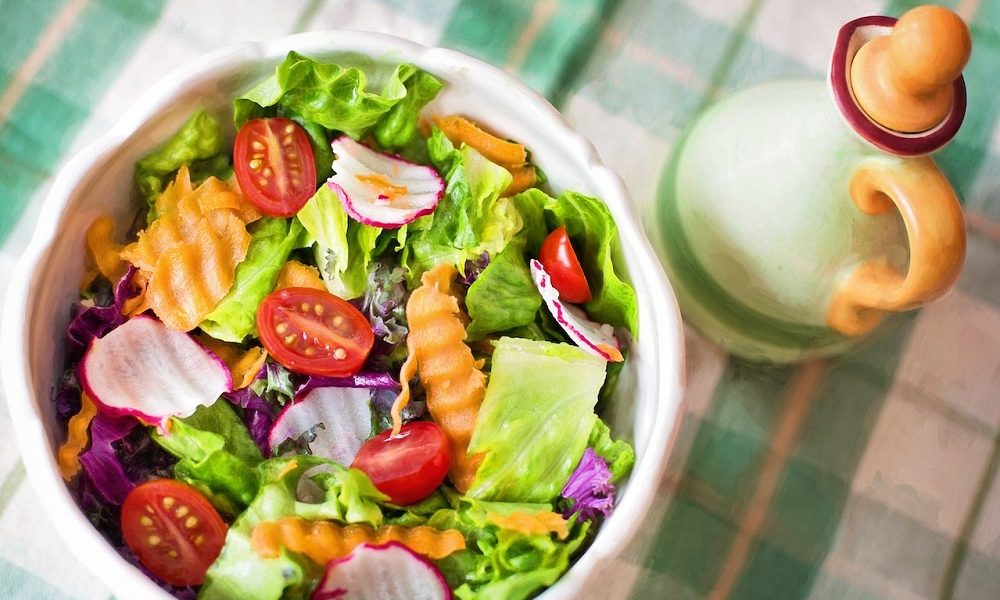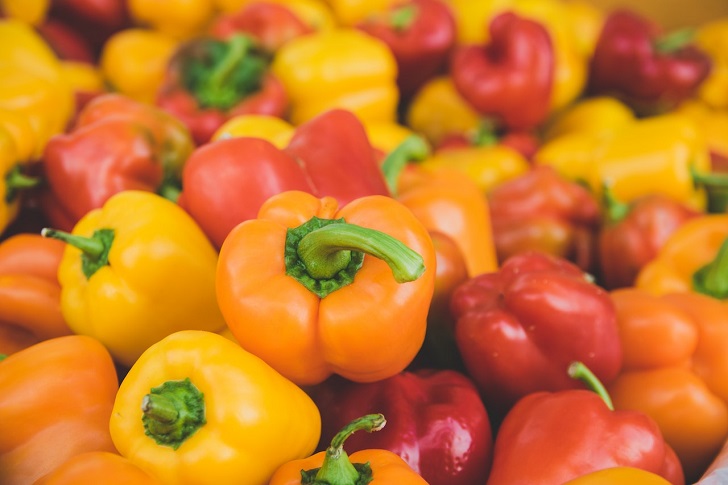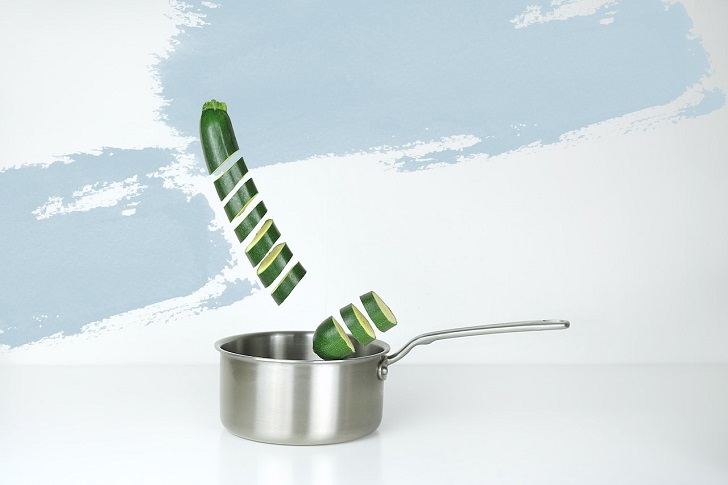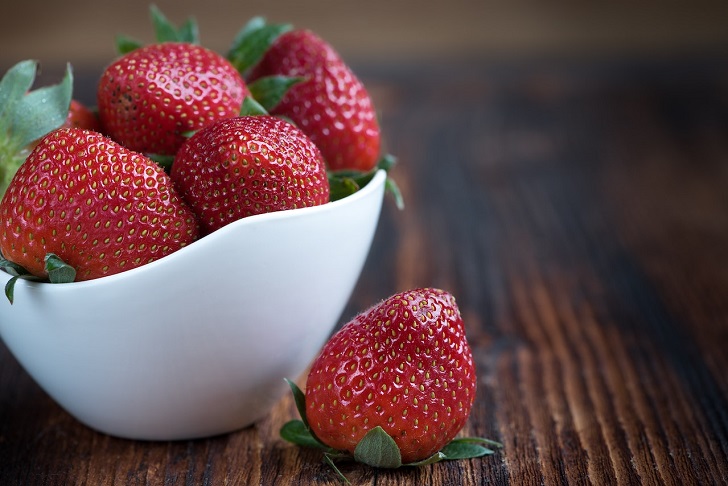
Foods With High Water Content

Water is the elixir of life, and staying adequately hydrated is crucial for maintaining our health and well-being. While sipping on water throughout the day is essential, it’s equally important to remember that hydration isn’t just about what you drink but also what you eat.
Incorporating foods with high water content into your diet can help keep you hydrated while providing valuable nutrients. This article will explore foods that can aid your quest for optimal hydration.
Bell Peppers
Bell peppers, especially the red and green varieties, contain a water content of approximately 92%. These colorful vegetables are rich in vitamin C and provide a satisfying crunch when sliced for snacking or added to dishes like stir-fries, fajitas, and omelets.

Kai Pilger/ Pexels | A bell pepper has the highest levels of Vitamin C of any produce item
Lettuce
Lettuce varieties like iceberg and romaine are mainly composed of water, containing approximately 95% water content. These leafy greens are a staple in salads, wraps, and sandwiches. While they may not offer as many nutrients as other vegetables, they contribute to your daily hydration needs.
Celery
Celery has earned its reputation as a crunchy, low-calorie snack thanks to its high water content of around 95%. It’s also a good source of fiber and essential nutrients like vitamin K and potassium. Celery makes a great addition to salads and soups and works great with spreads like peanut butter or cream cheese.
Cucumber
Cucumbers are perhaps one of the most water-rich vegetables, with a water content exceeding 95%. This crisp and refreshing vegetable is low in calories and a great source of vitamins and minerals, such as vitamin K and potassium. You can enjoy cucumbers in salads, sandwiches, or as a healthy snack with hummus.

Toa Heftiba Şinca/ Pexels | Cucumbers are 96% water; however, still are a great source of vitamin B1, B2, B3, B5 and B6, vitamin C, calcium, magnesium, and potassium
Oranges
Oranges, with a water content of approximately 87%, are juicy and loaded with vitamin C, fiber, and antioxidants. Consuming oranges and other citrus fruits can help keep you hydrated while supporting your immune system. Savor them as a refreshing snack or fresh-squeezed orange juice.
Zucchini
Zucchini is a versatile summer squash with a water content of around 94%. It’s a low-calorie vegetable that’s rich in vitamins A and C, as well as dietary fiber. You can enjoy zucchini in stir-fries, grilled as a side dish, or spiralized into “zoodles” for a healthier pasta alternative.
Tomatoes
Tomatoes are delicious and hydrating, with a water content of about 94%. They are a superb source of vitamin C, potassium, and the antioxidant lycopene. Tomatoes can be added to salads, used in sauces, or enjoyed in a classic caprese salad with fresh mozzarella and basil.

Pixabay/ Pexels | Strawberries are the first fruit to ripen each spring
Strawberries
Strawberries are another juicy fruit that can help quench your thirst. With a water content of about 91%, they’re a delicious source of hydration. These berries are also packed with vitamin C, fiber, and antioxidants. Enjoy them in yogurt parfaits, as a topping for oatmeal, or simply as a snack.
Watermelon
As the name suggests, watermelon is brimming with water content, typically around 90%. This summer favorite is not only hydrating but also a delightful treat. It’s rich in vitamins A and C and antioxidants like lycopene. Watermelon can be enjoyed alone or in smoothies, salads, or fruit platters.
Cabbage
Whether green or red, cabbage has a high water content of around 92%. This cruciferous vegetable is low in calories and an excellent source of vitamins K and C. You can enjoy cabbage in coleslaw, stir-fries, or as a crunchy taco topping.
More in Well-Being
-
`
Should I Visit a Chiropractor? The Tell-Tale Signs
If you’re wrestling with persistent discomfort in areas like your neck, back, or shoulders, you’re not alone. Many Americans are intimately...
July 19, 2024 -
`
Chad Smith and Will Ferrell Drum-Off – A Night of Comedy and Music
The year was 2014. The late-night talk show landscape was abuzz with a brewing battle unlike any other. It wasn’t a...
July 8, 2024 -
`
Can Coughing Cause Back Pain?
Back pain is a common complaint among many individuals, but did you know that a simple action like coughing can exacerbate...
July 5, 2024 -
`
How to Overcome Imposter Syndrome?
Imposter Syndrome is a familiar term many recognize as a psychological state where individuals doubt their accomplishments, fearing that others will...
June 27, 2024 -
`
Which Peptides Are Best for Anti-Aging?
For those seeking to combat the signs of aging and maintain a youthful appearance, the world of skincare can feel overwhelming....
June 18, 2024 -
`
Celebrities with Celiac Disease – Inspirational Stories and Struggles
Celiac disease is a serious condition, and even the rich and famous aren’t immune. Many celebrities have been open about their...
June 10, 2024 -
`
How to Fix Poor Sleep Hygiene for Better Rest
Sleep is a fundamental human need, as crucial for our well-being as a healthy diet and regular exercise. Yet, many people...
June 6, 2024 -
`
5 Easy & Effective Ways of Coping With Depression
Depression is more than just feeling sad or having a bad day. It is a pervasive mental health condition that affects...
May 30, 2024 -
`
Top 10 Practical 60th Birthday Ideas For Everyone
Turning 60 is a milestone worth celebrating! Whether you are planning your own bash or organizing a celebration for a loved...
May 24, 2024















You must be logged in to post a comment Login